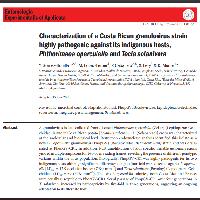Resumen
- A granulovirus isolate collected from diseased Phthorimaea operculella (Zeller) (Lepidoptera: Gelechiidae) larvae in Costa Rican potato [Solanum tuberosum L. (Solanaceae)] crops was characterized at the molecular and biological level. Restriction endonuclease analysis identified this isolate as a novel P. operculella granulovirus (PhopGV) (Baculoviridae: Betabaculovirus) strain and was designated as PhopGV-CR1. In addition, PCR amplification of four specific variable genomic regions yielded multiple amplicons for two open reading frames, revealing the presence of different genotypic variants within the virus population. Biologically, PhopGV-CR1 was highly pathogenic for its two indigenous hosts, although significant differences of up to four-fold were detected against P. operculella [LD50 = 17.9 occlusion bodies (OBs) mm)2 ] and Tecia solanivora (Povolny) (Lepidoptera: Gelechiidae) (LD50 = 69.1 OBs mm)2 ). The two P. operculella colonies, from Costa Rica and France, were equally susceptible to PhopGV-CR1. Serial passage of PhopGV-CR1 over four generations in T. solanivora increased its pathogenicity by five-fold in three generations, suggesting an ongoing adaptation to its alternate host.
